How to live well: 2nd meeting - mindset, motivation, positive emotions, exercise & sleep
Last updated on 15th May 2019
"Whether you think you can or you think you can't, you're right." Henry Ford
"Knowledge is only rumour, until it is in the muscle." New Guinea proverb
These are notes on the second evening of the ten-session "How to live well - a shared exploration" training. Comments on the first meeting can be found at "How to live well: 1st meeting - values, self-determination theory, roles & goals".
key points of the second meeting: At this second session we underline the importance of a Growth Mindset and Autonomous Motivation for improving Wellbeing, as well as highlighting that key foundational lifestyle practices - Exercise, Diet, Sleep & Dependencies/Addictions - are also crucial for high levels of Positive Emotions & Life Satisfaction. Our focus was on Exercise & Sleep this evening, next week we'll add in Diet & Dependencies.
the importance of a growth mindset: The quote at the start of this post makes a very important point - "Whether you think you can or think you can't, you're right". Professor Carol Dweck is the researcher most linked with emphasising the importance of a Growth versus a Fixed Mindset.
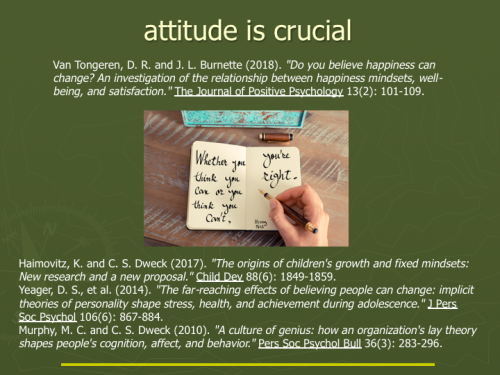
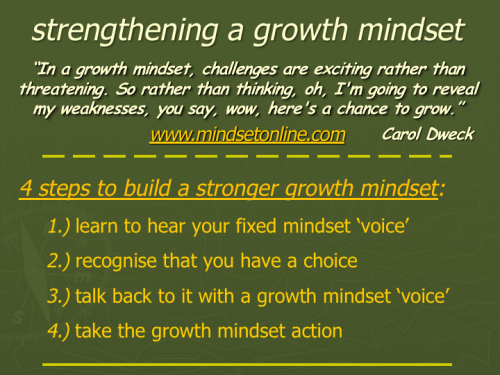
Working to respond more & more to challenges with a Growth Mindset makes great sense. Here's a link to Professor Carol Dweck's very well know book "Mindset", here's one to an excellent associated website, and here one to a 10-minute TED talk by Carol on "The power of believing that you can improve". These ideas can lead to wonderful changes, as illustrated in the resources I've just mentioned, or research papers like the deeply impressive 2018 studies "A single-session growth mindset intervention for adolescent anxiety and depression: 9-month outcomes of a randomized trial" or the very-relevant-for-our-wellbeing-course "Do you believe happiness can change? An investigation of the relationship between happiness mindsets, well-being, and satisfaction" with its abstract reading: "Three studies (N = 794) examined if beliefs about the malleable nature of happiness (growth mindsets) are associated with well-being and if this well-being had downstream implications for satisfaction with one’s relationships (Studies 1-3), health (Study 3), and job (Study 3). In Study 1 (N = 277), happiness growth mindsets were associated with greater well-being and greater relationship satisfaction. In Study 2 (N = 337), using an experimental paradigm and serial mediation, encouraging growth mindsets led to stronger beliefs in the changeable nature of happiness, which in turn was associated with subjective well-being, and, finally, relationship satisfaction. In Study 3 (N = 180), we replicated the downstream effects of growth mindsets of happiness on well-being and subsequently on relationship satisfaction and extended these serial mediation effects to health and job satisfaction. We discuss the implications of happiness mindsets."
autonomous & controlled motivations: This work on mindset overlaps, to an extent with research in Self-Determination Theory on the importance of 'Autonomous' rather than 'Controlled' Motivation ... see the next three slides below:
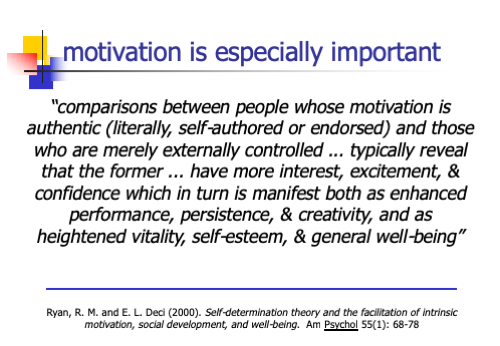
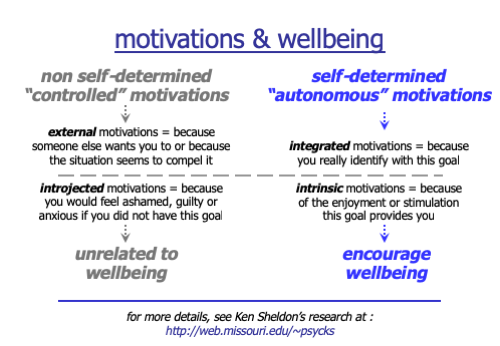
Often our motivations are a mixture of Autonomous & Controlled, but for important decisions it seems important to have the main weight of the motivation as Autonomous:
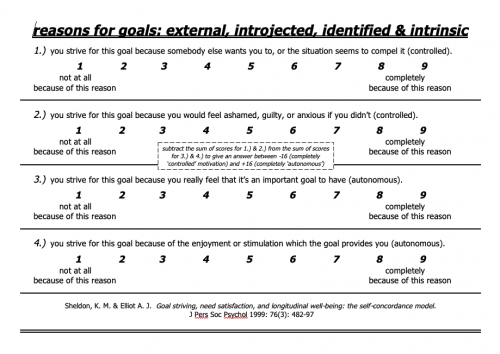
You can download the first two of these motivation slides as Powerpoint or PDF files and the questionnaire as Word or PDF files.
foundational lifestyle practices, exercise & sleep: After this discussion about the importance of a Growth Mindset and Autonomous Motivation for improving Wellbeing, we went on to highlight the value of key foundational lifestyle practices - Exercise, Diet, Sleep & Dependencies/Addictions.
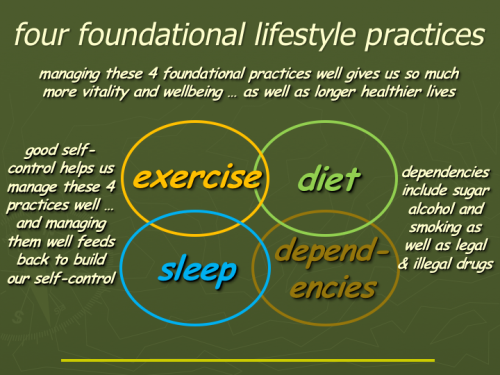
The links between foundational lifestyle practices - Exercise & Sleep - and Wellbeing tend to be two-way. So healthy Exercise & Sleep behaviours promote higher levels of Wellbeing, while at the same time higher levels of Wellbeing promote healthier Exercise & Sleep practices. It's probable that there's also a third pathway with further factors, for example levels of Conscientiousness or Secure Attachment, affecting both healthy lifestyle practices & Wellbeing. Weise et al's paper 2018 paper "Get active? A meta-analysis of leisure-time physical activity and subjective well-being" comments "Leisure-time physical activity (LPTA) is associated with both positive affect and life satisfaction ... Our results provide evidence for the importance of engaging in LPTA as a way of promoting SWB." And here are downloadable details of over a dozen further recent research papers documenting positive links between Exercise & Wellbeing. Fascinatingly good Exercise behaviours have long-term benefits for Wellbeing, and also for a healthier Personality and there are even longer-term knock-on benefits for our children's lifestyle practices & wellbeing (with then a further loop-back from the next generation's Wellbeing to our own). But despite these very evident long-term health & wellbeing benefits of exercise, it may be most important for exercise maintenance (and promotion) to highlight the great immediate benefits of exercise on positive emotions. I've written extensively about exercise on this website - see, for example, the many links in the Good Knowledge section on "Exercise & light", the caution to include strengthening in one's exercise practice - see "The recommendation to do strengthening exercises" - and recent research suggesting that really rather high levels of aerobic exercise may produce additional benefit over simply moderate levels (possibly especially as one gets older) - see "Association of cardiorespiratory fitness with long-term mortality among adults undergoing exercise treadmill testing".
Links between sleep difficulties and poor physical & psychological health are (as with exercise) two way, with poor sleep aggravating health problems and health problems aggravating sleep. It's likely that a third pathway leads from some underlying vulnerabilities to both sleep & general health difficulties. Examples of such vulnerabilities include a variety of possible life stresses and personality factors. The extent of sleep problems in the population at large is troubling but probably not as catastrophically so as some researchers claim. So Youngstedt et al's careful review - "Has adult sleep duration declined over the last 50+ years?" - concluded that "Analyses revealed no significant association of sleep duration with study year. The results are consistent with recent reviews of subjective data, which have challenged the notion of a modern epidemic of insufficient sleep". Somewhat similarly Yetish in the study "Natural sleep and Its seasonal variations in three pre-industrial societies", highlighted that "Preindustrial societies in Tanzania, Namibia, and Bolivia show similar sleep parameters ... They do not sleep more than “modern” humans, with average durations of 5.7–7.1 hr." I've written a blog post about this area - "Is short duration sleep a problem or is it just disturbed sleep that leads to increased mortality risk? A personal exploration" and more recently "Sleep: what is it, why does it matter, and how much do we need?". An excellent way to assess your sleep is to take the free online "Great British sleep survey". This takes less than a minute to give you an estimate of how adequately you sleep and ... if you want to ...will go on to assess physical, psychological & lifestyle factors that may be affecting your sleep. If sleep is a problem, there are a whole cluster of things one can do about this ... Colin Espie's books are helpful, as too are the results obtainable through the rather expensive, but excellent, Sleepio website.
Here are the "Home practice" requests for this second week:
1.) We're still working to strengthen our sense of self-direction, autonomy, determination & courage this week. Please choose another quotation on this theme to carry & connect to ... either from the "Using physical reminders to 'wake up' (spine)" list or from your own favourite quotes.
2.) Additionally please think about who you feel is an inspiring example of determined self-direction in how they lived (or are living) their life. They might be a friend or relative, someone else who you have known, or possibly someone you have read about or otherwise been inspired by. Try to get hold of a picture of them - Google Images can be helpful here. See if you can put the image you want to use into your Photos on your mobile, tablet & computer and then set it as your wallpaper for this week ... and you can also have the photo downloaded to carry with you as you do the quotation. Remember what you hope & intend the image & quotation will strengthen in you. Remind yourself regularly of this intention when you see them over the week.
3.) And for the third of these deepening Spine connection exercises ... please continue to practise the first "12-breath mini-meditation exercise" a couple of times daily. The recording is simply to remind you of the structure of the exercise. When you're doing the practice on your own, link it to 12 of your own breaths. Additionally once daily please try to practise a slightly longer 5-6 minute 'twice through' or an 8-10 minute 'three times through' version of the meditation. It's likely to be easier to remember these practices if you link them to events already anchored firmly in your day ... for example before/after meals, before leaving/after returning to your home, at bedtime, etc.
4.) Look again at the "4 steps to build a stronger growth mindset" suggestions on the initial slide at the start of this post (or on the 1st page of the handout you received at our 2nd meeting) ... 'learn to hear your fixed mindset 'voice'; recognise that you have a choice; talk back to the fixed mindset 'voice' with a growth mindset 'voice'; take the growth mindset action.' Don't overload yourself with too many 'home practice' tasks, but do consider looking again at Carol Dweck's 10-minute TED talk and the associated website. Her book "Mindset" is also well worth exploring and there are a series of good linked publications like, for example, the little "Growth mindset pocket book". Maybe one or both could go on your Christmas wish list!? As this year's research paper - "Do you believe happiness can change?" - clearly showed, nurturing a growth mindset during our 10-session training can make a significant impact on how much you get from this course.
5.) We know that living a Self-directed life, high in Autonomy & Competence, with strong relationships (Relatedness), and making a contribution to others (Beneficence) is very likely to be a life rich in a sense of Wellbeing ... with all the benefits of both welcome inner states and increased effectiveness that go with high Wellbeing. Last week we completed the "Funeral speeches exercise" ... clarifying how we most wanted to be remembered ... how we most want to live the various Roles of our lives. This links our Goals to Autonomous rather than Controlled Motivation with all the resulting benefits both for determination/energy/persistence in tackling the Goals and also for happiness/satisfaction/wellbeing when we make progress with them. I had suggested it might be useful to view these Roles as falling into three general areas ... Relationships, Work & Self-Care. This week & next we look at Self-Care and our focus is particularly on the 4 Foundational lifestyle practices ... Exercise, Sleep, Diet & Dependencies. This week we looked at Exercise & Sleep. We filled in Celebrations and What needs work on the sheet "Goals for roles: how are you doing at the moment?" as well as giving ourselves an overall Competence score for Self-Care over in the right column of this sheet. We then went on to make specific intentions for how we each wanted to work on Exercise and Sleep in the coming week ... and clearly these are important components of this week's Home practices.
6.) Finally, please glance back over the 11-page handout (plus the additional loose "How are you doing at the moment?" and "Four week record" sheets) you were given at this second meeting and on the last page "Week two reflection sheet", jot down how you found the evening ... especially what felt most interesting or important or useful for you.
Good luck with all of this. Each of us is in a different life situation as well as having differing abilities to make changes in our lives. Wherever you're starting, the best approach is likely to involve setting yourself a level of challenge in the Home practices that is stretching but not unrealistic. If we don't get out of our comfort zones, it's unlikely we'll benefit much from this course ... but at the same time, if we set ourselves unrealistic goals we'll stretch ourselves too much.
For details of the next meeting of the course, see "How to live well: 3rd meeting - willpower, wooping, diet & dependencies".
